Clara Gilbert Cole
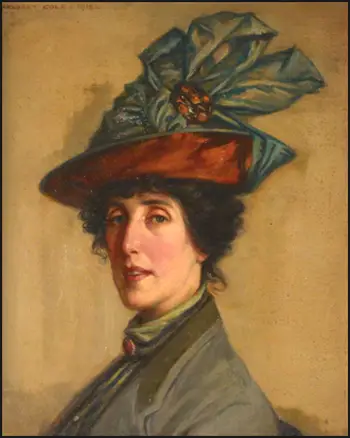
Clara Gilbert was born in Nantwich, Cheshire, on 4th December 1868. She was the third child of seven children from the union of Mary Jane Greaves (born 1839, Manchester) and Josiah Gilbert (born 1834, Nantwich). Josiah was a boot and shoe manufacturer in partnership with his brother James Gilbert. The boot and shoe making firm of Gilbert Brothers had its factory in Nantwich. (1)
At the time of the 1871 Census, Josiah Gilbert and his family were residing at Dysart Buildings, a terrace of nine Georgian houses on Monks Lane in Nantwich. On the census return, Clara's father is described as a "Shoe Manufacturer employing 57 men, 32 women & 15 boys". (2)
According to Sylvia Pankhurst: "Clara Gilbert Cole was the daughter of a boot manufacturer who many years before had suffered business misfortunes through unwillingness to adapt herself to the harsh conditions of modern commerce, and from refusal to produce anything save honest, hand-made all-leather wares." (3)
Her father, Josiah Gilbert, died on 20th December 1882, at his residence at 2 Alexandra Grove, Manchester and her mother, Mary Jane Gilbert, died less than two months later on 4th February 1883. On his death, Josiah Gilbert's personal estate was valued at £1,166 8s 3d but because of the death of his widow a couple of months later the original will was revoked. At her death, Mary Jane Gilbert had a personal estate worth £322 4s. (4)
Marriage to Herbert Cole
After leaving school Clara Gilbert become a "Telegraphist" in Manchester. Soon afterwards she met the artist, Herbert Cole, who was a member of the Socialist League and produced drawings for its newspaper, Commonweal. (5) His art and politics were deeply influenced by socialist artists such as William Morris, Walter Crane, John Everett Millais, William Holman Hunt, Dante Gabriel Rossetti and Frederick Shields. (6)
On 1st October 1898, at St Mark's Church, Cheetham Hill, Manchester, Clara Gilbert, aged 29 year-old, married 31 year-old artist Herbert Cole. The marriage was witnessed by Clara's younger brother, Roland Gilbert, and her youngest surviving sister, Emily Gilbert. (7)
The married couple moved to London and lived at 111 Warner Road, Walthamstow, Essex. Herbert found work as a teacher at Camberwell School of Art. According to a close friend: "He remained the most unassuming and kindly of the devotees of art, eking out the modest sums made by his rapid craftsmanship in teaching at the Camberwell School of Art, where he gathered round him an ever-growing band of affectionate students." (8)
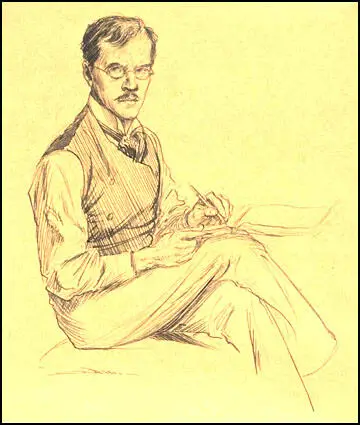
In 1901 Herbert Cole, his wife, Clara, and their young son, Philip (aged 1 year, 2 months) were residing at 403 Ivydale Road, Camberwell, Peckham, Surrey. Later they moved to 1 Yew Tree Cottages, Eynsford, Kent. By 1911 they employed a 16 year-old maidservant named Frances Annie Price. Also living in the house was the opera singer, Hilda Phoebe Travis (1879-1935) who performed on the stage under her maiden name, (9)
Clara and Herbert Cole were both politically active. They were both supporters of women's suffrage. Clara joined the Women Social & Political Union and Herbert supplied drawings for its newspaper, The Suffragette. (10) Cole also provided art work for the Women's Dreadnought. (11)
The couple lived at 85 Camberwell Grove, London, S.E. During this period Clara became friends with Sylvia Pankhurst. In her book, The Home Front: A Mirror to Life in England during the World War (1932) Sylvia described "Clara Gilbert, with her unusual slender loveliness, her deft fingers and vivid imagination, was like a caged bird in the post office." (12)
First World War
During the First World War, Herbert and Clara Cole were both active in the peace movement and feared the introduction of conscription. (13) On the outbreak of war in July, 1914, they placed advertisements in The Labour Leader about the formation of "League Against War and Conscription" and appealed for people to join a "united protest in case Conscription is thrust upon us." (14)
In November, 1914, Fenner Brockway and Lilla Brockway established the No Conscription Fellowship (NCF). Herbert and Clara were amongst the 150 people who joined the organisation in the first six days. (15) Clifford Allen, the manager of the first Labour Party daily newspaper, the Daily Citizen, and the author of the pamphlet, Is Germany Right and England Wrong? (1914) where he argued against Britain becoming involved in an European war, became Chairman of the NCF. "We have got to face the only possible outcome of our Socialist faith - I mean the question of non-resistance to armed force. Don't let us deceive ourselves. The sacredness of human life is the mainspring of all our propaganda. In my opinion there can be no two kinds of murder." (16)
Clara Gilbert Cole later recalled: "On 11th July 1915, Sunday, I went into Trafalgar Square with a linen placard bearing the words: 'Men and Women of England, Arbitration finally settles all wars. If at the end of a war, why not at the beginning? If not at the beginning why not now? Demand terms of settlement from our Government as the German people are doing.' ... Police did not interfere, but public was hostile and bloodthirsty in its remarks, wished to kill every Prussian, some said even women and children. The British soldiers did not make these remarks, though there were many about." (17)
When conscription was introduced in 1916 Clara Gilbert Cole went to Trafalgar Square with a badge saying "Stop the War", and a banner against conscription. She was arrested and brought to court though the charge was dropped - even though she returned to demonstrate many times against the war. (18) Clara wrote a series of anti-war pamphlets, including War Won't Pay (1916). (19)
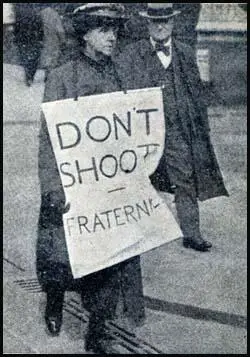
Clara Gilbert Cole also took part in a protest march with Rosa Waugh Hobhouse, a member of the Society of Friends: "Rosa Hobhouse and myself set out from Knebworth, Herts., on a walking tour distributing literature for Peace. We were trying to create an atmosphere of love and brotherhood between all nationalities, instead of this deplorable feeling of hatred which at present exists and is daily being fomented by the Press. We had walked 50 miles and distributed 2,000 leaflets when we were arrested near Kettering, and detained in the police cell five days." (20)
The women were charged under the Defence of the Realm Act. Their trial took place on 25th May 1916. Hobhouse argued in court: "It is very hard for me to understand the spirit behind the 'Defence of the Realm' Act. The only defence I can understand, or desire to take part in, is the defence of the Kingdom of God on earth; and the use of weapons of slaughter in the defence of that Kingdom is unthinkable. Its only true weapons are love and reason. It was because of this faith in me that I set forth on my journey. My other motive was the desire to spread thoughts of peace by negotiation. To negotiate is not to give in, it is simply to use reason instead of force.” (21)
Clara Gilbert Cole pointed out: "After being twice remanded, we were brought up under the Defence of the Realm Act and were fined £50 each, or three months’ imprisonment. Not considering ourselves guilty, we refused to pay the fine or allow it to be paid for us, and were taken to Northampton prison. History has taught me that new ideas are always born in pain, so we are contented to suffer and be misunderstood in order that future generations might reap the benefit." (22) Clara later recalled: "The cheerful and sympathetic comradeship of Rosa made my imprisonment very much easier than it would otherwise have been. It was my only rest during the war." (23)
Cole and Hobhouse were both sent to prison for five months. On her release Clara published a pamphlet, War Won’t Pay (1916) and distributed it to soldiers and civilians. "The police took the copies from her, but didn’t arrest her, thinking her driven crazy by the sight of wounded men." She also wrote several poems that were first published in the Women's Dreadnought and later in Prison Impressions (1918). (24)
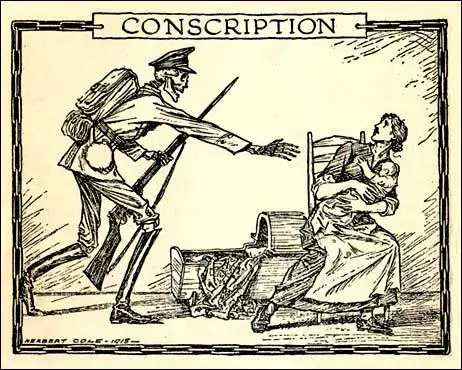
Clara's son, Philip Cole, was a conscientious objector and was sent to prison. At the end of the war in November, 1918, conscientious objectors were kept in prison. On 15th January 1919, Clara Cole began standing outside Wandsworth Prison, carrying a banner: "We protest against the persecution and imprisonment of conscientious objectors to war". She did this everyday until her son and other conscientious objectors were released in April 1919. Another placard called Christ "The Greatest Conscientious Objector" and reminded people that he said "Thou shalt not kill". (25)
Clara Gilbert Cole ended her campaign when the men were released in April, 1919, five months after the Armistice. Over 1,500 men refused all compulsory service. These men were called absolutists and were usually drafted into military units and if they refused to obey the order of an officer, they were court-martialled. Forty-one absolutists were transferred to France. These men were considered to be on active service and could now be sentenced to death for refusing orders. Others were sentenced to Field Punishment Number One. (26) Those found guilty before being transferred to France were sent to English prisons. Conditions were made very hard for the conscientious objectors and during the war and at least sixty-nine of them died in prison. (27)
Clara wrote about her campaign in the Women's Dreadnought. "The majority of the soldier prisoners are young, their ages ranging from 17 to 20. Some of the lads joined up when they were 15 and one soldier told me he ran away and joined up at 14. Those young lads cannot stand the discipline. Most of these boys and men would never have seen the inside of a prison but for the war.... A girl wife came out of prison and told me her husband and another C.O. who were to be sent to France. Knowing what they meant, I understood her state of mind as she hurried off to try and set the indifferent and cumbersome machinery of the War Office in motion, and then, in case he should be sent away without warning, come back to watch the prison for hours in extreme cold, as to many poor relations and friends of both C.O.'s and soldiers do. A sergeant came up to three soldiers to whom I was speaking and told them to clear off or I should convert them to Bolshevism. After they had gone away, I remarked to the sergeant: 'You are not afraid of me are you?' In a friendly voice he replied: 'It's a pity every one else has not got your intelligence'." (28)
Communist Party of Great Britain
Clara Gilbert Cole was a supporter of the Communist Party of Great Britain (CPGB) when it was formed in 1920. She also read Freedom, a newspaper produced by a group of anarchists. At first she felt she was sympathetic to the Bolsheviks taking power in Russia and complained about the criticism made by the anarchists. "The whole tone of the criticism in Freedom of the Russian situation is as if Communists had had every chance to initiate ideal Anarchist conditions. As a matter of fact, they have encountered a more tremendous opposition than any revolution in the history of the world has ever experienced. As yet they are the only people who have overthrown Capitalism, and in no such country has such progress to Socialism been made. It ill becomes those who have done nothing to carp and cavil." The editor replied that Lenin claims that “the struggle against bureaucratism is essential, and we shall do everything we can to help the workers and to crush the bureaucratic idea,” but argued that "bureaucratism is inherent in State Socialism, and as long as the Dictatorship lasts the bureaucracy will flourish like mildew in a damp cellar." (29)
Clara Gilbert Cole became involved in the early unemployed movement in the 1920s and along with William Rust of the CPGB formed the group Camberwell Organized Unemployed. In January 1921, people living in Woodbine Cottages in Ormside Street, Camberwell, were evicted by a local businessman. A group of people, headed by Cole and Rust, attempted to "reinstate" these evicted people. (30)
Cole and Rust were arrested and on 11th July, appeared in court. Cole published her account in the Women’s Dreadnought: "The case lasted nearly all day, not in the interests of justice – it was merely a pretense – but in order that the law might be able to boast it allowed Dallas and Rust to call witnesses. The evidence of these same witnesses was entirely ignored in the summing up. The sentence was a foregone conclusion. I had long since ceased to expect anything but injustice in the Courts. Property is far, far more sacred than life." (31) Cole was convicted of wilful damage and fined 40s, or 28 days. She answered: "I'll do the 28 days." (32)
On her release from prison Cole revisited Woodbine Cottages. "Mrs. Cole learnt that Mr. Crook, the landlord, had offered to take one of the re-installed families, to the Workhouse in his motor-car, if they would only agree to go! The mother replied that to go to the Workhouse would mean separation from the children; she would drown herself and them rather than submit to that. Mr. Crook threw out into the alley the mattress and fireguard to the family who had set out to walk to Tonbridge." (33)
On 10th October 1924, MI5 received a copy of a letter, dated 15th September, sent by Grigory Zinoviev, chairman of the Comintern in the Soviet Union, to Arthur McManus, the British representative on the committee. In the letter British communists were asked to take all possible action to ensure the ratification of the Anglo-Soviet Treaties. It then went on to advocate preparation for military insurrection in working-class areas of Britain and for subverting the allegiance in the army and navy. (34)
The Daily Mail published the Zinoviev Letter on 25th October 1924, just four days before the 1924 General Election. Under the headline "Civil War Plot by Socialists Masters" it argued: "Moscow issues orders to the British Communists... the British Communists in turn give orders to the Socialist Government, which it tamely and humbly obeys... Now we can see why Mr MacDonald has done obeisance throughout the campaign to the Red Flag with its associations of murder and crime. He is a stalking horse for the Reds as Kerensky was... Everything is to be made ready for a great outbreak of the abominable class war which is civil war of the most savage kind." (35)
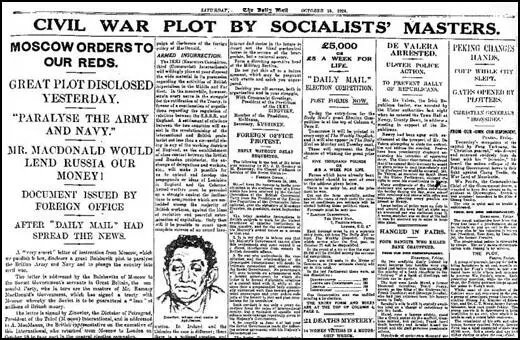
Clara Gilbert Cole was targeted as part of this communist conspiracy. The authorities were concerned by her pamphlet, Parliament, the People's Enemy (1922). The Yorkshire Post and Leeds Intelligencer reported: "It is of course, an essential feature of this Russian propaganda that Parliaments should be held up to derision, Parliament, the People's Enemy by Clara Gilbert Cole, is one of the many publications devoted to this purpose, and its keynote is 'Parliament is a machine for exploiting the people, not for defending them.' It is on these lines that the extremist group have striven successfully to 'control' the Socialist Government by means of a liaison committee, so that the Government might be responsible, not to Parliament, but to this committee and that which they represent." (36)
Anarchism
Herbert Cole died at 21 Gwendwr Road, West Kensington, London, on 12th September 1931, at the age of 64. The National Probate Calendar (Index of Wills) recorded that Herbert Cole left effects valued at £16 5s. (37) After his death Clara Gilbert Cole presented some of his work to the Victoria & Albert Museum and the British Museum. (38)
By the 1930s Clara Gilbert Cole was active in the anarchist movement in Britain providing "vigorous" support for the National Confederation of Trabajo (CNT) and the Anarchist Brigades during the Spanish Civil War. During the Second World War she was visited by John Hewetson in her very small cottage at Kirby-le-Soken. He described how popular she was with the village children who regularly visited her to hear her story-telling. In 1936 she published The Objectors to Conscription and War. (39)
Even in old age she retained her strong political beliefs. On one occasion she attended a performance of Beethoven's Ninth Symphony at the Queen's Hall in London. At the end of the performance the orchestra played "God Save the Queen". The audience was shocked to hear Clara shouting from the gallery "God Save the People!". (40)
Clara Gilbert Cole died on 4th February 1956 at the age of 87.
Primary Sources
(1) Clara Gilbert Cole, Prison Impressions (1918)
I append a preface to explain why I was imprisoned, also to show how I was handicapped in recording these impressions. I wish to forestall the critics who seek correct literary form or literary ability. I did not write against war in order to obtain a literary reputation; neither in protesting against it did I wait to acquire one. Intense pity for suffering humanity and anxiety to spread the gospel of International Brotherhood (by which means alone man can express the greatest that is in him) ceaselessly urges me to protest against the demoralisation and slaughter of men through unnecessaru war. Whilst in prison, I petitioned for pencil and paper - my only request was refused. I had a slate and was allowed to send out one letter a fortnight. That letter consisted of a folded sheet with four sides, one of which was occupied with printed instructions. All that is contained in this little book was written in prison and sent home in my fortnightly letter. Space being limited, the difficulties were great.
We were imprisoned for speaking the truth: no statement we made was refuted. To relate briefly the cause of our arrest, I will go back to Wednesday, May 10, 1916, when Rosa Hobhouse and myself set out from Knebworth, Herts., on a walking tour distributing literature for Peace. We were trying to create an atmosphere of love and brotherhood between all nationalities, instead of this deplorable feeling of hatred which at present exists and is daily being fomented by the Press.
We had walked 50 miles and distributed 2,000 leaflets when we were arrested near Kettering, and detained in the police cell five days. After being twice remanded, we were brought up under the Defence of the Realm Act and were fined £50 each, or three months’ imprisonment. Not considering ourselves guilty, we refused to pay the fine or allow it to be paid for us, and were taken to Northampton prison. History has taught me that new ideas are always born in pain, so we are contented to suffer and be misunderstood in order that future generations might reap the benefit.
(2) Clara Gilbert Cole, When (c. 1915)
When the hand will not rise to smite, And the heart will refuse to fight, When munitions cannot be made, And we to shape Death shrink, afraid To see the gangrened flesh, erstwhile So white, and see the silent pile
This hour was active limb and brain, Then surely we shall end this pain.
They pray to God “to end this strife”, He waits for them to stay the knife.
(3) Clara Gilbert Cole, The Alternative (1918)
Better Barren women then children bred for war,
Better death in birth than manhood trained for murder;
Better bleak wild country than shattered flesh and bone
Better voided earth before Primeval Sundawn;
And better dead blank world it battles still must rage -
But best of all no war at all,
And Peace in a Golden Age
(4) Clara Gilbert Cole, Women's Dreadnought (24th May 1919)
The majority of the soldier prisoners are young, their ages ranging from 17 to 20. Some of the lads joined up when they were 15 and one soldier told me he ran away and joined up at 14. Those young lads cannot stand the discipline. Most of these boys and men would never have seen the inside of a prison but for the war.
Two lads were brought up and as the door shut their escorts fumed up and down, declaring they were heroes and ought to be decorated for what they had done, not imprisoned. They had been twice over the top, taken prisoners in Germany and escaped, then, just for over staying their leave, they were imprisoned. I have yet to see officers, either in handcuffs, or escorted to be punished by drill until they drop, and, as one soldier said, to be picked up to drill again. No, the officers order the punishment instead, and as a C.O. remarked: "The principle of militarism is to make the men more afraid of their own officers than they are of the enemy."
A girl wife came out of prison and told me her husband and another C.O. who were to be sent to France. Knowing what they meant, I understood her state of mind as she hurried off to try and set the indifferent and cumbersome machinery of the War Office in motion, and then, in case he should be sent away without warning, come back to watch the prison for hours in extreme cold, as to many poor relations and friends of both C.O.'s and soldiers do.
A sergeant came up to three soldiers to whom I was speaking and told them to clear off or I should convert them to Bolshevism. After they had gone away, I remarked to the sergeant: "You are not afraid of me are you?" In a friendly voice he replied: "It's a pity every one else has not got your intelligence. "A soldier told me that when a friend of his received his discharge papers, he tore them up, laid them on the officer's table, and said: "Now I am going to be a conscientious objector."
(5) Clara Gilbert Cole, Freedom (1st March 1921)
The whole tone of the criticism in Freedom of the Russian situation is as if Communists had had every chance to initiate ideal Anarchist conditions. As a matter of fact, they have encountered a more tremendous opposition than any revolution in the history of the world has ever experienced. As yet they are the only people who have overthrown Capitalism, and in no such country has such progress to Socialism been made. It ill becomes those who have done nothing to carp and cavil. The least they can do if they cannot help is to remain silent till Russia is in such a position that the application of strigent criticism is fair and allowable. Even if our editor is unrepentant, I hope the matter will be looked upon in a broader light.
Editor: Lenin admits that "new means must be applied and tried," and that "the struggle against bureaucratism is essential, and we shall do everything we can to help the workers and to crush the bureaucratic idea." But bureaucratism is inherent in State Socialism, and as long as the Dictatorship lasts the bureaucracy will flourish like mildew in a damp cellar.
(6) The Daily Herald (28th June 1922)
The raid on Woodbine Cottages, Ormside Street, Camberwell, in which several evicted tenants were returned temporarily to their homes, was recalled at Tower Bridge Police Court yesterday.
Charges of being concerned in wilfully damaging the doors of Nos. 6, 7, and 8, and with breaking five windows were brought against: Stanley Ernest Dallas, William Rust, and Mrs Clara Gilbert Cole, all at the National Unemployed Committee.
Dallas and Rust pleaded not guilty and were remanded in sureties of £25 each.
Mrs Cole was convicted of wilful damage and fined 40s, or 28 days.
"I'll do the 28 days," she said.
(7) The Workers' Dreadnought (8th July 1922)
On her revisiting Woodbine Cottages after her release from prison, Mrs. Cole learnt that Mr. Crook, the landlord, had offered to take one of the re-installed families, to the Workhouse in his motor-car, if they would only agree to go!
The mother replied that to go to the Workhouse would mean separation from the children; she would drown herself and them rather than submit to that.
Mr. Crook threw out into the alley the mattress and fireguard to the family who had set out to walk to Tonbridge.
(8) Clara Gilbert Cole, Worker’s Dreadnought (22nd July 1922)
I have to thank you for the generous space offered in The Dreadnought, which has enabled me to correct misleading and pernicious reports regarding Ormside Street cottage evictions.
Willful perversions of the truth by the Capitalist Press, we expect; but we do not expect it from a Socialist paper.
What was really an eviction case was coupled in the Press reports with a robbery with which those who were there had no connection whatever.
The Daily Herald repeated this report, with my name in full and address, but the following day left it out when forced to give an explanation that it was not a raid on a works but an attempt by the organized unemployed to reinstate some evicted people.
I ignored my own treatment, but I must take up the case of Comrade Rust, as he is unable to defend himself as he is now in prison.
On Tuesday, July 11th, the trial of Rust and Dallas lasted almost all day, and by conclusive and overwhelming evidence Rust was proved to have been absent from the eviction having stayed behind to see to the business of the Branch.
It was also proved that he only came up after the arrival of the policeman who took Dallas and myself to the works of Mr. Crook (who is the owner of the cottages) when Rust, who had just come up, offered, as he was our Secretary, to accompany, watch and report on our behalf….
The Daily Herald to this important (from the housing standpoint) trial gave a small paragraph deliberately misrepresenting the case, saying "During the Camberwell unemployed raid on a motor works William Rust was sentenced, etc." I wish to make it clear that neither on June 20th nor on any other date was there a raid on the works of Mr. Crook by the organized unemployed.
No charge was brought in Court by any Government official or private person that a raid was made on a motor works. We have never been charged with that, and I repeat did not go near the works until Dallas and myself were taken there by a policeman. Though I had opened up to forcing open three doors, and have been tried and punished for it, still Rust and Dallas were charged with forcing those doors, and were sentenced partly on that account.
No windows were broken. Why should we break the windows of the people whom we were tring to reinstate?
The case lasted nearly all day, not in the interests of justice – it was merely a pretense – but in order that the law might be able to boast it allowed Dallas and Rust to call witnesses. The evidence of these same witnesses was entirely ignored in the summing up.The sentence was a foregone conclusion. I had long since ceased to expect anything but injustice in the Courts.
Property is far, far more sacred than life.The reason Comrade Rust is in prison is, first, he dares to be secretary of the unemployed, men who fought, sad to say, to maintain the very Courts that now imprison them. Secondary, he is a budding Socialist, and had to be nipped in the bud.
Thirdly, this putting people under shelter is not to be tolerated or encouraged.
(9) Yorkshire Post and Leeds Intelligencer (27th October 1924)
The exposure of Zinovieff's intrigues in Britain makes it desirable to throw some light upon the methods by which the Communist in Britain try to fulfil their instructions from the Communist International…
It is difficult to keep track of Communist "Sunday Schools" where such things are taught, but there were, at any rate recently, several in Leeds, namely in Derby Crescent, Elland Road and Fleece Lane…
It is of course, an essential feature of this Russian propaganda that Parliaments should be held up to derision, Parliament, the People's Enemy by Clara Gilbert Cole, is one of the many publications devoted to this purpose, and its keynote is "Parliament is a machine for exploiting the people, not for defending them." It is on these lines that the extremist group have striven successfully to "control" the Socialist Government by means of a liaison committee," so that the Government might be responsible, not to Parliament, but to this committee and that which they represent.
(10) Clara Gilbert Cole, The Objectors to Conscription and War (1936)
On 11th July 1915, Sunday, I went into Trafalgar Square with a linen placard bearing the words: "Men and Women of England, Arbitration finally settles all wars. If at the end of a war, why not at the beginning? If not at the beginning why not now? Demand terms of settlement from our Government as the German people are doing." ‘I have a footnote to this in a book I kept with signatures of men opposed to war. The note reads thus: "Police did not interfere, but public was hostile and bloodthirsty in its remarks, wished to kill every Prussian, some said even women and children. The British soldiers did not make these remarks, though there were many about."

